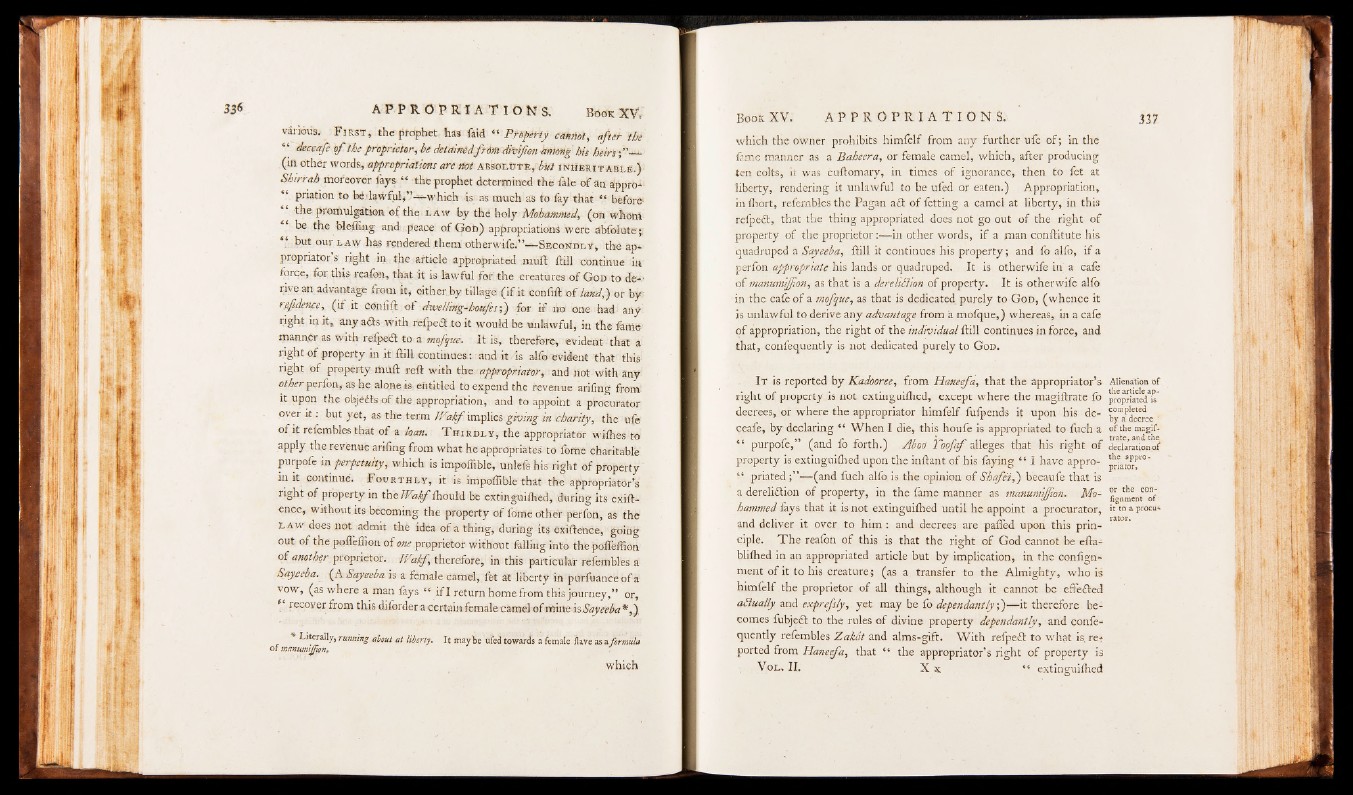
various. F i r s t , the Jifophet has feid “ Property canm, after the
“ deceqfetftbe proprhtar,todetMnèdfrM&fyifionlimóng his h e in f'^
(ill cither words., appropriations are riot absolute, but inheritable.)
Shtrrah moreover lays “ the prophet determined the file of an
priation to bé' lawful / ’ -^which is as much as to fey that “ beförê1
■ the promulgatioa of the raw by the holy Mohammed.\ (on whom
be the Welling and peace of Goh) appropriations were abiblute ;
but our law has rendered them otherwife.’’^ S econdly, the ap-
propriator s right in t.he article appropriated mull ftill continue in
force, for this reafoij, that it is lawful for the creatures of G on to dè-.‘
rive art advantage from it, either bv tillage (if .it confiftof land,) or by-
rf0deneer ( if it confift o f dweKng^hmfhsi) for if fro one had any
right ip it, any afts with refpecf.to it would be unMwful, in the feriitt-
manner as with refpefl to a mafque* It is, therefore, evident that a
right of property in it ftill continued:-and it . is alfo evident that this
right Of property huift reft with the, appropriaW, and not with any
other perfon, as he alone ife entitled tb expend the revenue arifing from
it upon the objects of the appropriation, and to appoint a procurator
over i t : but yet, as the term Wakf implies giving in charity, the ufé
o f it refembles that of a loan. T hirdly, the appropriator willies to
apply the revenue arifing from what he appropriates to feme charitable
purpofe 1 s\ perpetuity, which is impoffible, unleft his right of property
in it continue. F ourthly, it is impolfible that the appropriator'»
right of property in the W akf Ihould be extinguilhed, during its exift-
ence, without its becoming the property of fame other pferfon, as thé
law does not admit thè idea of a thing, during its exiftence, going
out of the paffeffion of one proprietor without falling into the pofleffion
of another proprietor. Wakf, therefore, in this particular refembles a
Sayeeba. {A Sayeeba is a female camel, let at liberty in purfuance of a
vow, (as where a man fays “ i f l return home from this journey,” or,
i recover from this diforder a certain female camel o f vemx&i&Sayeeba * ,)
* Literally, running about at liberty. It may be tiled towards a female (lave as a formula
o f manumitfm,
which
which the owner prohibits himfelf from any farther ufe of; in the
feme manner as a Baheera, or female camel, which, after producing
ten colts, it was cuftomary, in times of ignorance, then to fet at
liberty, rendering it unlawful to be ufed or eaten.) Appropriation,
in Ihort, refembles the Pagan aft of fetting a camel at liberty, in this
refpedt, that the thing appropriated does not go out o f the right of
property of the proprietor:— in other words, if a man conftitute his
quadruped a Sayeeba, ftill it continues his property; and fo .alio, if a
perfon appropriate his lands or quadruped. It is other wife in a cafe
of manumijjion, as that is a derelitlion of property. It is otherwife allb
in the cafe of a mofque, as that is dedicated purely to G o d , (whence it
is unlawful to derive any advantage from a molque,) whereas, in a cafe
of appropriation, the right of the individual ftill continues in force, and
that, confequently is not dedicated purely to G o d .
I t is reported by Kadboree, from Hatteefa, that the appropriator’s
right of property is not extinguilhed, except where the magiftrate fo
decrees, or where the appropriator himfelf fufpends it upon his de-
ceafe, by declaring “ When I die, this houfe is appropriated to fuch a
“ purpofe,” (and lb forth.) Aboo Yoofaf alleges that his right of
property is extinguilhed upon the inftant of his faying “ I have appro-
“ priated ;”— (and fuch alfo, is the opinion of Shafe'i,') becaufe that is
a dereliction of property, in the feme manner as manumijfion. Mohammed
fays that it is not extinguilhed until he appoint a procurator,
and deliver it over to him : and decrees are pafied upon this principle.
The reafon of this is that the right of God cannot be efta-
blilhed in an appropriated article but by implication, in the confign-
ment of it to his creature; (as a transfer to the Almighty, who is
himfelf the proprietor of all things, although it cannot be effected
actually and exprefsly, yet may be fo dependantly;)— it therefore becomes
fubject to the rules of divine property dependant ly, | and confer
quently refembles Zakdt and alms-gift. With refpect to what is. ret
ported from Haneefa, that “ the appropriator’s right o f property is
V ol. II. X x A extinguilhed
Alienation of
the article appropriated
is
completed
by a' decree '
o f the magiftrate,
and the
declaration of
the appropriator,
or the con-
fignment of
it to a procu*
rator.